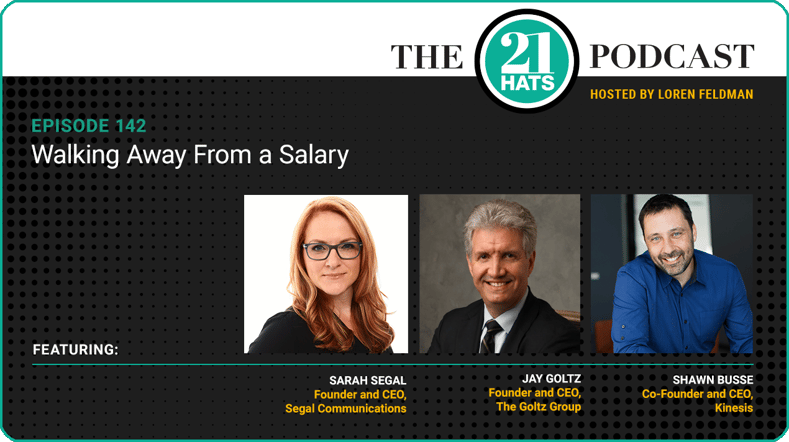
Introduction:
This week, Sarah Segal tells Shawn Busse and Jay Goltz why she’s decided to take her public relations business back after selling it two years ago to a larger firm so it could handle the back-end stuff and allow her to focus on public relations. For Sarah, the immediate result of the decision to break away has been an exhausting few months starting over, including reincorporating, finding health insurance, and reducing her own pay. Meanwhile, Jay suggests an old-school marketing tactic that involves leveraging an envelope, a stamp, and the post office. And Shawn explains how he created a sales process that has allowed him to remove himself from day-to-day sales. Plus, a listener asks the three owners, “When do you know if you’ve made it? Or do you never know?” Shawn, Jay, and Sarah—three owners at very different stages of building a business—offer three very different answers.
— Loren Feldman
This content was produced by 21 Hats.
See Full Show Notes By 21 Hats
Key Takeaways:
Acquisitions don't always pan out, and it's okay for two businesses to part ways when the vision is lost and it no longer makes sense to have them merged.
In this podcast episode, Sarah Segal explains that she recently ended an acquisition that happened two years ago. She explains that the acquisition was not going in the direction she wanted it to go and that the natural flow of business opportunities she had hoped for was not happening. She explains that the primary issue was that the majority of the company was on the East Coast, and the majority of her team was on the West Coast, making it difficult to coordinate. She says that she dissolved her LLC, and she restarted her entire business, which was stressful. However, the team made it through the transition, they're still showing up to work every day, all employees are being paid the same, and things are looking up.
If you want your business to grow, you have to know as a leader when to let go. It's not the job of the CEO to know how to do every role within the company. Sometimes as a CEO it's difficult to stop working IN the business and start working ON the business. Business leaders don't need to have their hands on everything, it's okay to let go, and they'll be better off for it!
Sarah Segal shares that she's one of those people that really likes to know how to do everything. It’s hard for her to not understand how to do every role in the company. Segal shared that she has a social media team that knows how to do all these bells and whistles on social media, and if they were to ever depart, she'd be in the hole, because she couldn’t step in and help. She's come to terms with the fact that knowing how to do everything in the business isn't a good use of her time and she needs to be focusing on the business, not the day-to-day operations. Jay Goltz shares how that transition is the jump from profession to running a business. He shares that he certainly can’t do everything that all his employees do, and that transition is just a jump you have to finally get to. There are lots of people who never get to that stage, and they go their entire career like that with three employees, because they need to have their hands on everything. And it stunts their growth.
As an entrepreneur, it can be difficult to know when "you've made it." Some entrepreneurs will never feel that way. It all depends on the person, what that person is setting out to accomplish, and whether or not they feel like they need someone else's words to affirm that whatever it is they've built is of any significance.
Sarah Segal shares that she doesn't don’t think an entrepreneur should ever feel like they’ve made it. That once they have that feeling, then they'll stop moving forward and become complacent. She shares that there’s always another hill to climb, another opportunity, and another challenge. Jay Goltz shares that he feels completely liberated that he made it, and that there was a certain number that solidified that for him. Once he finally hit that number he said, “You know what, I will never be hurting for money. I can buy anything I want. Life is grand. I made it." He shares that he's not complacent, he's still going to work and still trying to grow. Not like he used to, because he doesn't need to. Shawn Busse shares that he thinks it boils down to extrinsic rewards or intrinsic rewards. Earlier in his life, he was much more extrinsically motivated. As he built a business, it was all about, “How do you get to a million dollars?” Because that’s a threshold that a lot of people can’t get past. So he worked and worked and worked, and got past the million dollars. Like, “Okay, well, what now?” And, “Okay, well, let’s see if I can do it twice.” And he worked and worked and worked, and then he accomplished that. Eventually he came to a place in his life where he realized that it was less important to him to know how other people measured his success and was no longer driven by that.
Read Full Podcast Transcript Here
.png)




